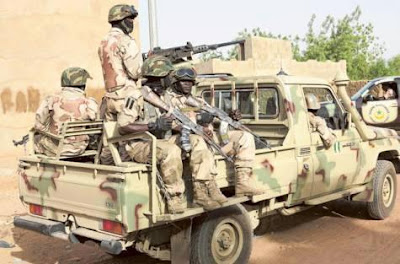Deadly Clash Between Nigerian Police And Boko Haram Islamists Kill 9
Islamist sect Boko Haram attacked a police station in northeast Nigeria on Wednesday, killing two officers but losing seven of its members, ...
http://www.africaeagle.com/2013/08/deadly-clash-between-nigerian-police.html?m=0
Islamist sect Boko Haram attacked a police station in northeast Nigeria on Wednesday, killing two officers but losing seven of its members, two local security sources said.
The attack came two days after the military said the group's bellicose leader Abubakar Shekau might have died between July 25 and August 4 from gunshot wounds inflicted in a gun battle with security forces.
Shekau's alleged death has done little to quell the insurgency but Boko Haram's capabilities appear weakened since President Goodluck Jonathan declared a state of emergency in northern Nigeria's three worst-affected states and launched an offensive against them in May.
The sect wants to impose Islamic law in Nigeria's north, and, alongside other spin-off Islamist groups, has become the biggest threat to stability in Nigeria.
"The Boko Haram men opened fire on policemen at the Gwoza Police Station at about 8 a.m. (0700 GMT) today," a local security source told Reuters, confirming the death toll.
A senior police officer also confirmed the deaths but asked not to be named because he is not authorized to speak.
Attacks on police stations and on villages that the militants suspect to be harboring vigilantes have continued this month. More than 30 people died in an assault on the town of Konduga on August 12.
Around that time, Shekau -- or someone claiming to be him -- appeared in a video distributed to journalists describing recent attacks in a way that would suggest he was still alive.
In its statement on Monday, the military dismissed the video as the work of an impostor. The man in the video, though he has Shekau's trademark beard and finger wagging -- does appear younger and rounder-faced than the Shekau of previous videos.
Gwoza is about 135 kilometers away from Maiduguri, the capital of Borno state where Boko Haram was formed. Security officials believe the sect has camps in Gwoza, where 11 soldiers on an anti-insurgency operation were killed in June.
The insurgency initially subsided in the offensive but there has been an uptick in violence in the past month.
Boko Haram's main targets are security forces or government officials. It has also carried out several attacks on Christian and Muslim worshippers, as well as schools and markets.
The attack came two days after the military said the group's bellicose leader Abubakar Shekau might have died between July 25 and August 4 from gunshot wounds inflicted in a gun battle with security forces.
Shekau's alleged death has done little to quell the insurgency but Boko Haram's capabilities appear weakened since President Goodluck Jonathan declared a state of emergency in northern Nigeria's three worst-affected states and launched an offensive against them in May.
The sect wants to impose Islamic law in Nigeria's north, and, alongside other spin-off Islamist groups, has become the biggest threat to stability in Nigeria.
"The Boko Haram men opened fire on policemen at the Gwoza Police Station at about 8 a.m. (0700 GMT) today," a local security source told Reuters, confirming the death toll.
A senior police officer also confirmed the deaths but asked not to be named because he is not authorized to speak.
Attacks on police stations and on villages that the militants suspect to be harboring vigilantes have continued this month. More than 30 people died in an assault on the town of Konduga on August 12.
Around that time, Shekau -- or someone claiming to be him -- appeared in a video distributed to journalists describing recent attacks in a way that would suggest he was still alive.
In its statement on Monday, the military dismissed the video as the work of an impostor. The man in the video, though he has Shekau's trademark beard and finger wagging -- does appear younger and rounder-faced than the Shekau of previous videos.
Gwoza is about 135 kilometers away from Maiduguri, the capital of Borno state where Boko Haram was formed. Security officials believe the sect has camps in Gwoza, where 11 soldiers on an anti-insurgency operation were killed in June.
The insurgency initially subsided in the offensive but there has been an uptick in violence in the past month.
Boko Haram's main targets are security forces or government officials. It has also carried out several attacks on Christian and Muslim worshippers, as well as schools and markets.








































